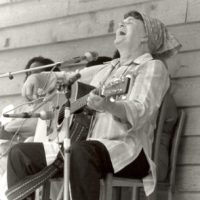
Ola Belle Reed
Photo by Bill Boyarsky.
One of thirteen children in a musical family in Lansing, North Carolina, Ola Wave Campbell (she changed her name to Ola Belle) became a prolific songwriter and performer. In 1986, she was awarded the National Heritage Fellowship by the National Endowment for the Arts for her banjo playing and singing.
Musical influences came from both sides of her family. Grandfather Alexander Campbell, a Primitive Baptist preacher, was “notorious” for playing his fiddle. Ola Belle’s father, Arthur Harrison Campbell, a schoolteacher and storekeeper, played fiddle, banjo, guitar and organ and organized a band with his brother Doc and sister Ellen. She learned her clawhammer banjo style from her Uncle Dockery Campbell before she was old enough to go to school, and later learned guitar and organ from her Aunt Ellen. Her Uncle Bob Ingraham, her mother’s cousin, conducted singing schools in the mountains, and Uncle Herb Osborne sang mining songs from the coalfields of West Virginia. From her grandmother and mother, she learned many of the traditional ballads and songs of the Appalachian region.
In 1934, the Campbells moved from Ashe County to southeastern Pennsylvania, then to Maryland. In the wake of the Depression, many people from Northwest North Carolina and Southwest Virginia were making similar moves in search of jobs and good farmland. Invited to join the North Carolina Ridge Runners, one of the first hillbilly bands in the Delaware-Maryland area, Ola Belle put her musical skills to work in 1936. The Ridge Runners were popular performers on live radio broadcasts and for dances and other social gatherings among Appalachian migrants in the region. Her brother Alex, who served in World War II, joined the band as guitarist after the war.
Ola Belle’s marriage to Ralph “Bud” Reed in 1949 brought another musician into the family. Together they made ends meet doing various kinds of work, along with their music and raising two boys. During that time, Ola Belle and Alex began what became a long and influential career in radio broadcasting. Their group, New River Boys and Girls, performed in the area for nearly 30 years. Alex and Ola Belle also opened the New River Ranch music park in 1951, which featured performances by bluegrass and country stars for seven years. In 1969, Ola Belle, Bud, and their son David began performing together regularly, returning Ola Belle to a family band setting where her music flourished.
Ola Belle Reed was a featured performer at the 1972 Smithsonian Folk Festival in Washington, DC, and she recorded 75 songs for the Library of Congress. Several of her compositions, including “High on a Mountain,” and the autobiographical “I’ve Endured,” have been widely recorded and performed. Since 2006, the Ola Belle Reed Homecoming Festival has been held in Lansing in honor of Ola Belle and the Campbell family.


